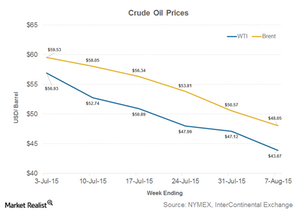Will Coal Rise on Falling Crude Oil Prices?
WTI crude oil prices fell by over $3 per barrel during the week ended August 7 and averaged below $50 per barrel for the third consecutive week.
Aug. 23 2015, Updated 2:06 p.m. ET

Crude oil prices
WTI (West Texas Intermediate) crude oil prices fell by over $3 per barrel during the week ended August 7 and averaged below $50 per barrel for the third consecutive week. WTI averaged $43.87 per barrel during the week ending August 7 compared to $47.12 during the week ended July 31.
The average Brent crude oil price dropped $2.52 to $48.05 per barrel for the week ended August 7, compared to $53.81 a week earlier. A continued glut, coupled with concerns over China’s growth prospects, pulled crude oil prices down. Weak crude oil prices may force American producers to cut production.
Since oil wells also produce some natural gas, cutting oil production may also mean a drop in natural gas production if everything else is constant. The drop in natural gas production may result in higher natural gas prices, which may benefit coal.
Why are crude oil prices important for coal producers?
While coal and crude oil don’t directly compete with each other as fuels, it’s important for coal investors to track crude oil prices. Coal producers (KOL) like Alliance Resource Partners (ARLP), Arch Coal (ACI), Peabody Energy (BTU), and Cloud Peak Energy (CLD) are affected in various ways by falling crude oil prices.
Crude oil prices are a mixed driver for the coal industry (KOL) in the United States. On the one hand, a fall in crude oil prices results in a fall in fuel costs. Weakness in crude oil prices may encourage US crude oil producers to cut down production, pressuring freight rates. Moreover, if crude oil production falls, there would be more railcars available to transport coal. Coal producers based in the Powder River Basin faced severe rail availability issues in 2014.
Energy stocks, including coal stocks, generally follow crude oil prices. The fall in crude oil prices in 2H14 pulled all energy-related stocks down. On the other hand, a rise in oil prices leads to a rise in fuel costs for coal producers. But a rise in crude oil prices also signals positive sentiments for the overall energy sector.
For utilities (XLU), the impact of oil prices isn’t significant, as oil isn’t a major fuel that powers electricity generation in the United States.
